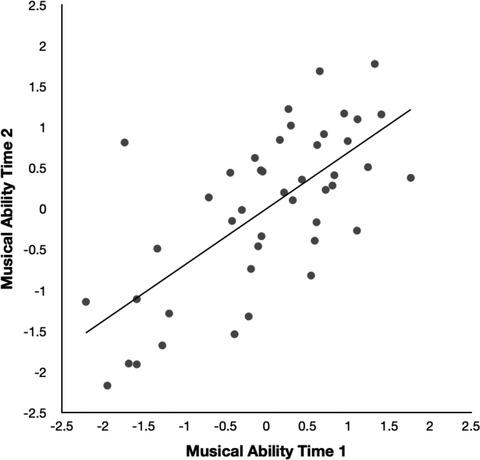Our official English website, www.x-mol.net, welcomes your
feedback! (Note: you will need to create a separate account there.)
Individual differences in musical ability are stable over time in childhood
Developmental Science ( IF 3.1 ) Pub Date : 2020-12-31 , DOI: 10.1111/desc.13081 Haley E Kragness 1, 2 , Swathi Swaminathan 1, 3 , Laura K Cirelli 2 , E Glenn Schellenberg 1, 4
Developmental Science ( IF 3.1 ) Pub Date : 2020-12-31 , DOI: 10.1111/desc.13081 Haley E Kragness 1, 2 , Swathi Swaminathan 1, 3 , Laura K Cirelli 2 , E Glenn Schellenberg 1, 4
Affiliation

|
The development of human abilities stems from a complex interplay between genetic predispositions and environmental factors. Numerous studies have compared musicians with non-musicians on measures of musical and non-musical ability, frequently attributing musicians’ superior performance to their training. By ignoring preexisting differences, however, this view assumes that taking music lessons is akin to random assignment. In the present longitudinal study, the musical ability of 5- to 10-year-olds was measured at Time 1 with a test of music perception and cognition. Five years later, at Time 2, the children took the same test and a second test designed for older listeners. The test-retest correlation for aggregate scores was remarkably high, r ≈ 0.7, and remained strong when confounding variables (age, cognitive abilities, personality) were held constant. At both time points, music training was associated with musical ability, but the association at Time 2 became nonsignificant when musical ability at Time 1 was held constant. Time 1 musical ability also predicted duration of subsequent music training. These data are consistent with results from genetic studies, which implicate genes in all aspects of musical behavior and achievement, and with meta-analyses, which indicate that transfer effects from music training are weak. In short, early musical abilities significantly predicted later abilities, demonstrating that individual differences are stable over time. We found no evidence, however, to suggest that music training predicted musical ability after accounting for prior ability. The results underscore the importance of considering preexisting abilities in any type of learning.
中文翻译:

音乐能力的个体差异在童年时期随着时间的推移是稳定的
人类能力的发展源于遗传易感性和环境因素之间复杂的相互作用。许多研究将音乐家和非音乐家的音乐和非音乐能力进行了比较,经常将音乐家的出色表现归因于他们的训练。然而,通过忽略先前存在的差异,这种观点认为上音乐课类似于随机分配。在目前的纵向研究中,5 至 10 岁儿童的音乐能力在第 1 时间通过音乐感知和认知测试进行测量。五年后,在时间 2,孩子们参加了相同的测试和为年长听众设计的第二次测试。总分的重测相关性非常高,r ≈ 0.7,并且当混杂变量(年龄、认知能力、个性)保持不变时保持强劲。在这两个时间点,音乐训练都与音乐能力相关,但当时间 1 的音乐能力保持不变时,时间 2 的关联变得不显着。时间 1 的音乐能力也预测了后续的持续时间音乐训练。这些数据与基因研究的结果一致,这些研究表明基因与音乐行为和成就的各个方面有关,而荟萃分析表明,音乐训练的转移效应很弱。简而言之,早期的音乐能力显着预测了后来的能力,表明个体差异随着时间的推移是稳定的。然而,我们没有发现任何证据表明音乐训练在考虑了先前的能力后可以预测音乐能力。结果强调了在任何类型的学习中考虑预先存在的能力的重要性。
更新日期:2020-12-31
中文翻译:

音乐能力的个体差异在童年时期随着时间的推移是稳定的
人类能力的发展源于遗传易感性和环境因素之间复杂的相互作用。许多研究将音乐家和非音乐家的音乐和非音乐能力进行了比较,经常将音乐家的出色表现归因于他们的训练。然而,通过忽略先前存在的差异,这种观点认为上音乐课类似于随机分配。在目前的纵向研究中,5 至 10 岁儿童的音乐能力在第 1 时间通过音乐感知和认知测试进行测量。五年后,在时间 2,孩子们参加了相同的测试和为年长听众设计的第二次测试。总分的重测相关性非常高,r ≈ 0.7,并且当混杂变量(年龄、认知能力、个性)保持不变时保持强劲。在这两个时间点,音乐训练都与音乐能力相关,但当时间 1 的音乐能力保持不变时,时间 2 的关联变得不显着。时间 1 的音乐能力也预测了后续的持续时间音乐训练。这些数据与基因研究的结果一致,这些研究表明基因与音乐行为和成就的各个方面有关,而荟萃分析表明,音乐训练的转移效应很弱。简而言之,早期的音乐能力显着预测了后来的能力,表明个体差异随着时间的推移是稳定的。然而,我们没有发现任何证据表明音乐训练在考虑了先前的能力后可以预测音乐能力。结果强调了在任何类型的学习中考虑预先存在的能力的重要性。











































 京公网安备 11010802027423号
京公网安备 11010802027423号